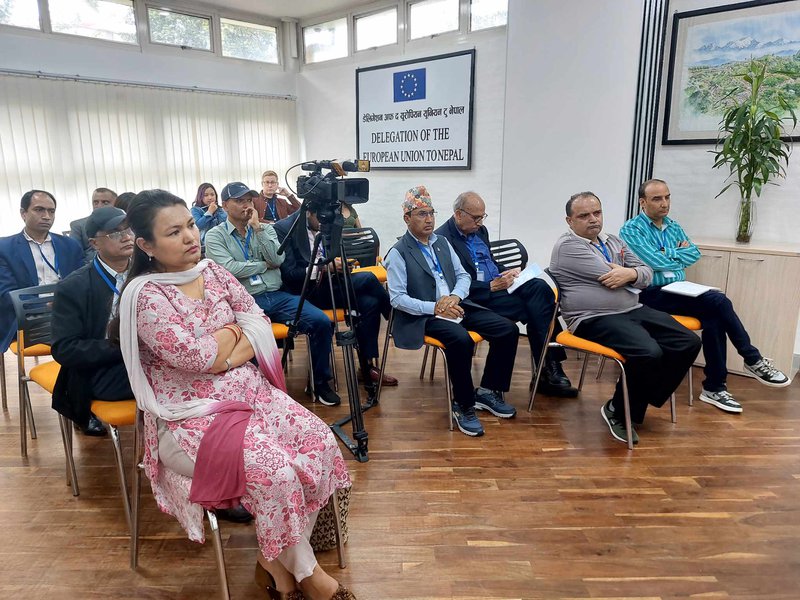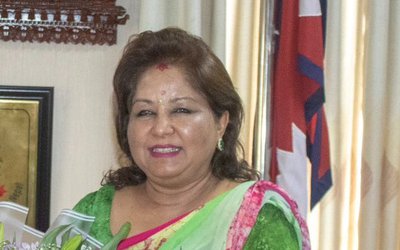
Veronique Lorenzo, the newly appointed ambassador of the European Union to Nepal, expressed her optimism towards Nepalese youth. She described her interactions with members of the Youth Sounding Board, established by the European Delegation in Nepal, as inspiring due to the bold and candid statements made by the young people. Ambassador Lorenzo is deeply impressed by the board's Nepalese youth members.
"I had the opportunity to meet and interact with members of the Youth Sounding Board." I am impressed by the youths' intelligence and eloquence. They immediately addressed issues of exclusion and lack of inclusion in Madhesh. The young men are well-informed and vocal about these issues, according to Ambassador Lorenzo.
She said that the level of openness and dialogue that is possible." "I am delighted to be here," said Ambassador Lorenzo. I have a French mother and a Spanish father, making me truly European. The majority of my career has been spent working abroad in Latin America, Africa, and Asia, which excites me most and is the reason I love this job. This experience gives me a valuable tool to better understand Nepal, although I have visited the country before, I cannot claim to have a comprehensive knowledge of it. Nepal is a culturally rich and ancient nation with complex traditions. However, I am hopeful that I will be able to learn a few things that will assists me in this regard.
There is valid reason for this remarks. With more than 50% of the population being youth, Ambassador Lorenzo believe that members of EU formed Youth Sounding Board help to reach the programs to youth.
In her first media engagement hosted at the EU Delegation office, Ambassador Lorenzo discussed recent global events and their effect on the EU's assistance to Nepal.
She also mentioned the commemoration of 50 years of diplomatic ties between the EU and Nepal this year. Ambassador Lorenzo elaborated on the development of EU-Nepal relations over the past five decades and shared her priorities for Nepal in the next three years.
Regarding the issue of EU assistance to Nepal in graduating from the Least Developed Countries (LDCs) to a middle income country by 2026, it was stated that the European Union will offer Nepal all required technical and other forms of support in the graduation process from LDC status to middle income status.
The priorities of the European Union in Nepal are climate change, education, youth promotion, and constitution implementation with special emphasis on engaging youth in policymaking. Our Youth Sounding Board members have been discussing youth-related issues," stated Ambassador Lorenzo.
Additionally, she mentioned that the European Union will be commemorating 50 years since establishing diplomatic relations with Nepal by organizing various events.

Ambassador Lorenzo, visited Nepal twenty years ago as a tourist. Having arrived in Nepal a month ago to serve as an ambassador, Veronique notices significant changes.
"When I visited Nepal twenty years ago, Kathmandu was different. I have observed many differences." There are tall buildings and a large population here. When examining the human development indicator, we can observe significant progress over the years, which is commendable. "Having been here for a month, I am pleased to see
She stated that the Russian invasion of Ukraine and the recent terrorist attack by Hamas in Israel would have significant impacts on various sectors. She also mentioned that Nepal supported the European Union's position and voted in favor of Ukraine while opposing the Russian invasion.
"I was not present immediately after the Russian invasion of Ukraine, but I can see that the country responded by voting for a United Nations resolution against Russia. I can imagine that for a country like Nepal, it is concerning when a large neighbor invades in defiance of international rules established by the UN. It carries a strong message when a small country like Nepal sees such a breach of these rules."
She said that undoubtedly, Nepal has backed the European Union's vote for the UN resolution affirming the sovereignty and right to live of Ukraine. Ambassador added that the collapse of the international system could leave small and weak nations vulnerable to the ambitions of larger countries.
She said that it is imperative for all of us to vigorously resist any actions by countries like Russia that seek to invade and violate the independence and sovereignty of Ukraine.
Excepts of the Press Meet
EU in Nepal
The EU has been present in Nepal for a significant amount of time. The EU has been present in Nepal for a significant amount of time. Next year marks the 50th anniversary of the establishment of relations between the European Union and Nepal. However, it is crucial to examine the evolution of this relationship over the past five decades. In the beginning, the European Commission had a development mandate and functioned primarily as a development partner. After the integration of the European Union, construction has become more extensive and sophisticated.
Our relations are more diverse today than fifty years ago. Additionally, the European Action Service was established to conduct the foreign policy of the European Union and has been in operation for twelve years. We maintain a network of 170 delegations worldwide, sometimes in partnership with member state embassies, such as those of Germany, France, and Finland present here, but overall representing the interests of all European Union member states. Most member states have resident ambassadors in Delhi, indicating an increase in dimension and the nature of our relations. Proper structure and grammar will be ensured, with precise word choices and consistent citation and footnote formatting. The Union also has a coordinating role.
Regarding the EU's priorities with Nepal, there are three: promoting green recovery through investment in clean and renewable energy, bridging internal gaps by strengthening the grid, and equipping Nepal for future export with its vast hydropower potential. The second priority is to invest in human capital. Our long-standing investment in education has yielded positive results. However, there is still much to achieve, particularly in terms of education quality and inclusivity efforts. We have made good progress. Thirdly, we prioritize governance by supporting the federalism agenda, constitution, and local governments. These efforts are integral to the successful implementation of federalism. This is our agenda for the development of Nepal.
My top priority is to engage as many young people as possible across the country to gain a deeper understanding of the country's priorities and challenges. We operate mainly in Sudur Paschim, Karnali, and Madhesh Provinces, where we have a Youth Sounding Board consisting of young people.
They assist us in recognizing and addressing pertinent issues objectively. The creation of climate opportunities is a key concern in present-day Nepal, and we must discover superior methods to promote such opportunities. Our ongoing and high-priority programs are already working towards this goal.
Youth Sounding Board
During my interaciotn with The Youth Sounding Board, I was immensely impressed by their endeavors. They are intelligent and articulate young people who immediately began discussing issues of exclusion, particularly in Madhesh. A young man was well informed and passionate about these issues. One member, a female lawyer from Karnali, spoke candidly and boldly about dignified menstrual cyclein at a large group. She openly and clearly expressed the state of young women in the province. Listing problems and issues in a table is a useful approach. Regarding local governments, I will provide a more informed answer after my first mission to Madhesh.
On Climate Change
Climate change is a serious issue, and Nepal is one of the countries directly affected. Unfortunately, there is no immediate solution. The responsibility to take action does not solely fall on the European Union. Instead, it is Nepal's government that needs to take action. We always support the actions taken by the government of Nepal.
In our multilateral commitments, the EU has made ambitious reductions in carbon emissions, with several pledges that we can encourage our partners to adopt. The EU has already reduced overall emissions by 14 percent. We cannot make significant progress alone. The most critical aspect is making and maintaining commitments, as well as advocating, especially for significant players, to adopt similar emissions reduction commitments. There is a need for a national policy to reduce emissions. The EU supports Nepal's education plan. I understand that Madhesh is facing problems, and we are continuing to work on that.
On the EU budget
Nepal, you are correct that there is currently significant pressure due to budgetary constraints, which is a frequent topic of discussion in Brussels. Nevertheless, it should be noted that we do have a budget for Nepal, with an assistance envelope allocated from 2021 to 2027. A review mission is scheduled for 2024. I cannot make any promises, but all indications suggest that Nepal's performance is strong enough to protect the budget. The future, however, is uncertain due to the constantly changing world. The recent terrorist attack on Israel has shocked the world and led to another dramatic war. The recent terrorist attack on Israel has shocked the world and led to another dramatic war. The recent terrorist attack on Israel has shocked the world and led to another dramatic war. Nevertheless, for the next few years, we must remain vigilant. We anticipate continued work in Nepal with dedication and determination fueled by these funds.
Graduation Support
Graduation support is guaranteed, and we will aid Nepal in adopting the overall opportunities that are available to middle-income countries. The EU offers the GSP+ that presents packages concerning trade and barriers, among other things. However, numerous conditions must be met. The GSP+ is a special incentive program that promotes Sustainable Development and Good Governance by providing support to vulnerable developing countries that have ratified 27 international conventions on human rights, labor rights, environmental protection, climate change, and good governance. Nepal is currently working on some of these conventions, and we can aid in their completion to ensure Nepal achieves the best possible graduation.
On ICT
On the ICT subject, I cannot provide more specific information. This is a starting point for identifying issues related to regulations and laws. What is the government of Nepal's interest in requesting support? We cannot suggest any initiatives at this time. It is up to the government of Nepal to make a formal request for support.
On Air Safety:
Flight safety regulations require every country to meet certain criteria, including Nepal. It's important to note that this is not a blacklist, but a safety list. Nepal has been subject to Air Safety Rules for ten years, and has made progress toward meeting assessment mission requirements since mid-September. It was a technical mission led by the European Commission with a few members from member states. They performed an assessment and plan to submit a report. The Air Safety Committee of the European Union, consisting of member states, will review the report and determine if Nepal can be removed from the Air Safety blacklist. This is the current information available. The committee will reach a decision by mid-November, specifically November 14th-16th. Then, I will be able to provide a more detailed explanation, and the conclusion will be available to the public.
On Constitution
Nepal has implemented a new constitution in 2015 following extensive discussions and an eight-year drafting period. We will strictly adhere to the constitution. Federalism is challenging, and conflicts often arise between federal, provincial, and local governments. I have worked in several countries where such issues were resolved through federalism. There are always challenges present in any system. While I have worked in Brazil and Ethiopia without major issues, Nepal's geographical location poses connectivity difficulties and ethnic diversity poses additional challenges. However, we are committed to taking all necessary actions to address these challenges and make progress towards resolution.

Keshab Poudel
Poudel is the editor of New Spotlight Magazine.
- HELVETAS NEPAL’S RIVERBED FARMING: Shift From Overseas To Local Farming
- Jul 26, 2024
- POLITICAL SCENARIO : K.P. Sharma Oli's Resurgence
- Jul 21, 2024
- UNDP/MinErgy: An Inventive Approach To Clean Brick Kiln
- Jul 19, 2024
- HELVETAS NEPAL: Nutrition Through Riverbed Farming
- Jul 18, 2024
- NOU Opens To All: Dr. Shilu Manandhar Bajracharya, Vice Chancellor
- Jul 15, 2024
















